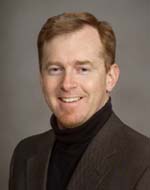 by Preston MacDougall February 24, 2005
If Henry Fonda were alive today, he would still be younger than Ray Crist, a chemistry professor who retired from Messiah College, in Pennsylvania, just last year. He was 104 at the time, and was, by all accounts, the oldest worker in the United States. I understand that Dr. Crist is continuing his research on the abilities of various plants to extract, through their roots, heavy metal pollutants, such as mercury and lead, from soil and groundwater. Far from being prickly, his insatiable curiosity about the world around him was an inspiration to students and colleagues on campus, whether they wore a lab coat, or not. His longevity cannot fail to impress anyone who has worked long enough to know what a 401(k) plan is. With all the media hype surrounding the looming Social Security crisis/hoax (take your pick), perhaps it would be wise for us to first modernize the concept of retirement itself. For instance, you almost never hear a person talk of their "retirements". That word sounds like what you might find on the pillows at an upscale hotel in the evening, two of them at most. Ray Crist's retirement from Messiah College, after teaching there for 34 years, was actually his third retirement, not counting his post-war decision to leave his job as Director of Columbia University's Division of the Manhattan Project after World War II. Dr. Crist then worked at Union Carbide as a research chemist for 17 years, until his first official retirement in 1963. It is ironic to note that his main research project at Union Carbide involved searching for ways to convert coal into the hydrocarbons that are feed-stocks for various products such as plastics and lubricants. The discovery of large petroleum reserves in Saudi Arabia effectively put an end to this line of research, until recently that is. Dr. Crist used his first retirement to start a new career, this one in science education. He took a faculty position at Dickinson College, also in Pennsylvania, and where he received his B.S. degree in 1920. His stated mission was to teach an appreciation of science and technology to liberal arts majors, because they are the pool from which most policy-makers are drawn. He did this both in the classroom, and by involving such students in research projects doing chemical analysis of samples collected from nearby streams and ponds. Before the United States Supreme Court ruled it unconstitutional, Dr. Crist was forced to retire again when he reached the then-mandatory retirement age of 70. It was then that he began his long career at Messiah College, which was actually where he had graduated from high school in 1916! (In the intervening decades it had evolved into a four-year liberal arts college.) To avoid tax complications, Dr. Crist's salary at Messiah was one dollar. Low even by liberal arts standards. I doubt that he contributed very much to his 401(k) plan during his tenure at Messiah, but this brings me to the golden questions: What does it mean to retire? and, What is the purpose of a retirement plan? If you are like me, you will seek the advice of a certified financial planner, and the backing of a financial services company that is even older than Dr. Crist. These resources will help you attain the means to retire, but they cannot ascertain what retirement means. I suspect that this will be a highly individual answer, but we must recognize that large segments of society have already drifted away from the traditional concept of working forty hours per week until one's age reaches a magic number, then, go fish. Speaking of magic numbers, I heard an interesting lecture by Dr. Ken Dychtwald. He is the President of Age Wave, and widely regarded as a "guru" on ageing, and the market forces of demographic waves. He spoke on the past and future of retirement. In 1891, German Chancellor Otto von Bismark instituted the first guaranteed Social Security system, arbitrarily setting the beneficial age at 70, way beyond life expectancy at the time. In 1916, after World War I, the German government sank the Bismark retirement age down to 65, raising the hopes of many workers, but still beyond normal life expectancy at the time. Here in the U.S., President Roosevelt went with the magic number of 65, but for younger workers that number is already floating back up, and will reach a less magical number of 67 for those born in 1960, or later. If you are a young, walking American statistic, you can expect to go on walking well beyond the age where Social Security kicks in, and private retirement savings can be spent without major penalties. According to Ken Dychtwald, Ray Crist is on the cusp of the coming wave. In the future, it will be common to launch new careers during our golden years. Perhaps we should do our financial planning in this light. And while we're at it, let's come up with a new word for retirement - one that doesn't conjure up thoughts of magic numbers, fishing, or sleepy-time.
Preston MacDougall is a chemistry professor at Middle Tennessee State University. His "Chemical Eye" commentaries are featured in the Arts and Public Affairs portion of the Nashville/Murfreesboro NPR station WMOT (www.wmot.org).
|
||
